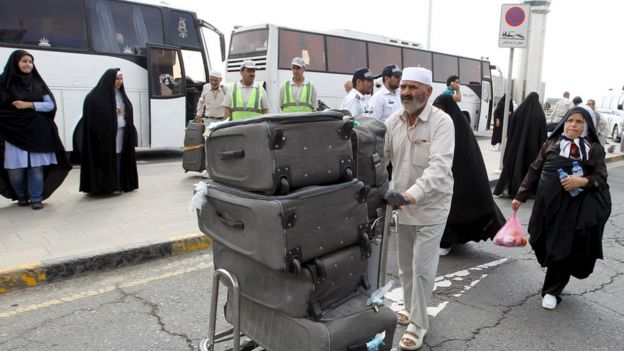The measure is designed to make it harder for the likes of those who carried out the Paris attacks and hold EU citizenships to use the programme known as the "visa waiver" to enter the US.
Citizens of 38 countries, many in the EU, can currently fly to the US without applying for a visa under America's Visa Waiver Program.
The new legislation initially said those eligible for the waiver programme who had travelled to "terrorist hotspots" like Iraq and Syria where IS controls territory would need to obtain a US visa.
But the final version included Iran and Sudan to the list of countries because they are considered "state sponsors of terrorism" by the US.
US to tighten visa waiver programme
The bill HR158 means citizens of many EU countries and the rest of the 38 states participating in the programme who travel to Iran for pleasure or business will have to obtain a visa should they ever want to enter the US.

It also adds the same restriction on hundreds of thousands of dual citizens of the EU, Australia and New Zealand who also have citizenship from these countries.
"Once again they punish Iranians for crimes committed by terrorists virtually every one of us despise, oppose and are fighting," Ali Abdi, a prominent Iranian-American human rights activist told BBC Persian.
"In fact we shouldn't punish anyone based on their place of origin."
Narges Bajoghli, a filmmaker in New York, took to Facebook to encourage her friends to contact their representative in Congress in opposition to what she called "singling out a group of people based on their ethnic background".
Twitter accounts and other Facebook pages dedicated to organising to protest against the bill have also been created, including @StopHR158, which references the official number of the bill.
The National Iranian American Council in Washington is lobbying to stop this bill from passing in the United States Senate.
"These provisions impacting Iranian Americans were added in backroom negotiations at the last minute without hearings or accountability," the group said in a statement.
And the ACLU, one of the leading civil rights organisations in the country, cautioned Congress "to avoid passing legislation that would broadly scapegoat groups based on nationality, and would fan the flames of discriminatory exclusion, both here and abroad".
On social media many Iranian Americans expressed shock that such limitations would be imposed on people who travel to Iran but not Saudi Arabia or Pakistan.
Others called it a continuation of presidential candidate Donald Trump's anti-Muslim rhetoric. 'It's so "Trumpesque"' tweeted Shayan, a German of Iranian background who said he was worried that his trip to US may be affected.
EU officials are also alarmed by the legislation.
David O'Sullivan, the European Union Ambassador to the US, told the BBC that he and ambassadors from EU member states have reached out to Congress and White House to raise what he called the "fear that the legislation at its current form could produce unintended consequences".
Mr O'Sullivan said the EU wants to "maintain the highest security of the visa waiver programme" but opposes "introducing new rigidities which would penalise millions of Europeans and Americans" who travel back and forth.
He stopped short of threatening to reciprocate against US citizens and said he remains focused on finding a way to resolve the issue through dialogue.
The US State Department said it does not comment on pending legislation.
Worried Iranians in EU and US are hoping to convince senators to at least take "Iran" out of the final version of the bill, especially after the recent nuclear deal and the prospect of sanctions against Iran being lifted next year.
"It will hurt European tourism and business travel to Iran," said Shabnam Tavasoli, an active member of the Facebook page set up to fight HR158.
"People will be deterred by the fact that one trip there means they will no longer be able to fly to US without the cumbersome process of getting a US visa through an embassy," he wrote, adding it was "preposterous" a British citizen couldn't use the programme if they had inherited Iranian citizenship from a parent.
By BBC










